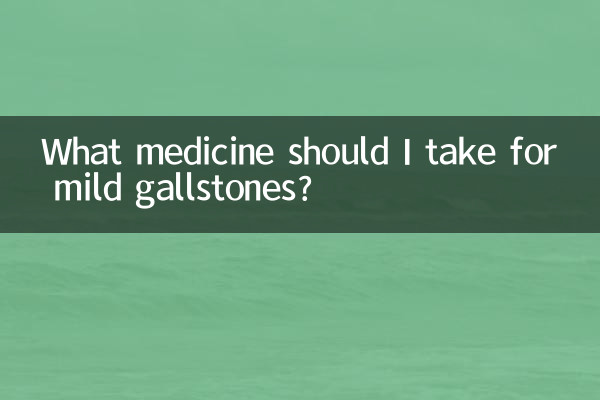What medicine should I take for mild gallstones?
Gallstones are a common biliary system disease, especially among people with irregular diets and high-fat diets. For patients with mild gallstones, drug treatment is one of the common options. This article will combine the hot topics and hot content on the Internet in the past 10 days to give you a detailed introduction to the drug treatment options and precautions for mild gallstones.
1. Common symptoms of mild gallstones

People with mild gallstones usually present with the following symptoms:
| symptom | describe |
|---|---|
| Dull pain in right upper abdomen | Usually worsened after eating fatty foods |
| indigestion | Bloating and belching after meals |
| Nausea and vomiting | Especially during acute attacks |
| Radiating pain in back | Pain may radiate to the right shoulder blade area |
2. Commonly used drugs for mild gallstones
According to recent medical information and expert recommendations, patients with mild gallstones may consider the following drug treatment options:
| drug type | Representative medicine | Mechanism of action | Things to note |
|---|---|---|---|
| Lithodissolving drugs | Ursodeoxycholic acid | Reduce cholesterol saturation and promote stone dissolution | Requires long-term use and regular review |
| choleretic drugs | Danning tablets | Promote bile secretion and improve cholestasis | Pregnant women should use with caution |
| Antispasmodic analgesics | Anisodamine | Relieves pain caused by biliary spasm | Not suitable for patients with glaucoma |
| Anti-inflammatory and choleretic drugs | Anti-inflammatory and choleretic tablets | Anti-inflammatory, choleretic, liver protective | Not suitable for long-term use |
3. Precautions for drug treatment
1.Take medication strictly as prescribed by your doctor: The drug treatment plan for gallstones needs to be formulated according to the type and size of the stones and the patient’s specific conditions. Do not buy or take medicine by yourself.
2.Regular review: During drug treatment, B-ultrasound should be reviewed every 3-6 months to evaluate changes in stones.
3.Diet coordination: Medication treatment needs to be combined with a low-fat diet, avoid greasy and spicy food, and drink more water.
4.Pay attention to drug side effects: Certain stone-dissolving drugs may cause side effects such as diarrhea and abnormal liver function, and liver function needs to be monitored regularly.
4. Recent hot topics related to gallstone treatment
According to the Internet hot spots in the past 10 days, the following gallstone-related topics have received widespread attention:
| hot topics | Attention | Main content |
|---|---|---|
| New progress in the treatment of gallstones with traditional Chinese medicine | high | Certain traditional Chinese medicine compounds show good stone-dissolving effects |
| Minimally Invasive Treatment Alternatives to Medical Treatment | middle | Discuss when surgery should be considered rather than medications |
| The relationship between gallstones and intestinal flora | high | Latest research finds that intestinal flora imbalance may increase the risk of gallstones |
| Diet therapy auxiliary drug treatment | middle | Certain dietary patterns may enhance drug efficacy |
5. Life conditioning suggestions
In addition to drug treatment, patients with mild gallstones should also pay attention to the following lifestyle adjustments:
1.regular diet: Eat regular and quantitative meals to avoid long periods of fasting.
2.Proper exercise: Maintaining moderate exercise helps bile excretion.
3.control weight: Obesity is one of the risk factors for gallstones.
4.hydration: Make sure you drink enough water every day.
6. When Do You Need Medical Treatment?
You should seek medical treatment promptly when the following situations occur:
| symptom | possible prompt |
|---|---|
| persistent severe abdominal pain | Biliary colic or cholecystitis |
| Fever and chills | Signs of infection |
| Sclera yellow staining | Biliary obstruction |
| Deeper urine, lighter stool | Bile excretion disorder |
In short, drug treatment for mild gallstones requires individualized plans and should be carried out under the guidance of a doctor. At the same time, good living habits are equally important as regular follow-up. If the symptoms worsen or signs of complications appear, seek medical attention in time to evaluate whether surgical treatment is required.

check the details

check the details